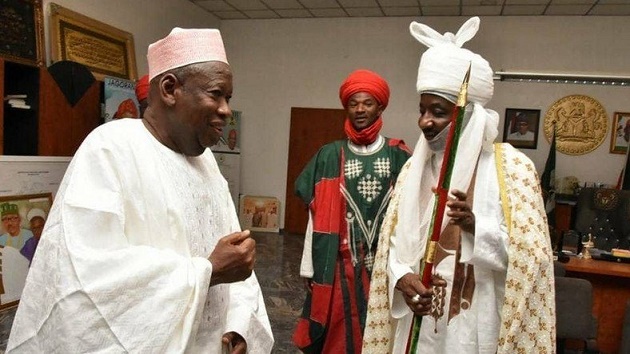Dangote brokers peace between Sanusi, Ganduje
Monday’s dethronement of Muhammad Sanusi II as Emir of Kano teaches indelible lessons about the dynamics of power in Nigeria. It signifies the painful loss of a unique opportunity for Nigeria and most importantly, northern Nigeria to harness the former Emir’s capacity to inspire irreversible development. It is avoidable time and opportunity lost.
Partisans have hit the market with narratives that promote their group and individual interests but from where I stand, the two parties in the conflict put themselves above the common good to arrive at this situation, which even if they do not realise it yet, does no one any good. I attempt a serial deconstruction of the issue.
Governor Abdullahi Ganduje’s administration in Kano State seemed determined to depose Sanusi by any means possible. It played its hand with such tackiness that the desperation was evident. In the fixation to remove Sanusi, Ganduje and his allies seem to have no laid-out plan except to grab at every flying whiff of idea, execute it and then go back.
All of it, from the split of the emirate to the various investigations and allegations of corruption, the rushed re-passage of the Emirate Council Law, the drama at the state house of assembly and the state executive meeting, which ultimately removed the Emir smell of attempts to call a dog a bad name to attain a determined goal. What put the joke on the whole exercise, however, is that of all serious allegations related to corruption and breach of public trust leveled against the Emir(for which he did not defend himself but which if proved would have snatched public sympathy from him), the government hung onto very laughable administrative reasons to remove him from office.
The statement, announcing the removal of the Emir, which was signed by the Secretary to the Kano State Government, Usman Alhaji, claimed that Sanusi earned his removal for disrespecting lawful instructions from the governor and refusal to attend meetings and government programmes. Snippets from the governor’s aide after the fact of Sanusi’s removal, however, suggest that there are more reasons than the lame ones in the SSG’s statement.
The PUNCH quoted Ganduje’ s Special Adviser on Media, Salihu Yakasai, as indicating that the major problem his principal had with Sanusi was the latter’s frequent public criticism of the governor. Yakasai told Channels Television’s ‘Sunrise Daily’ that it was wrong for Sanusi, who had private access to the governor, to criticise the governor in public. He went on to dismiss anyone who read ulterior motives into the action in these words: “So, you can portray it as political or whatever but the fact remains that no one would allow such disrespect and open criticism when you have access to him.”This Yakassai’s vituperation exposed the mind-set of the governor and his allies. It revealed the altercation between these important personalities to be nothing more than a show of power.
Advertisement
Now, this is one of the most disheartening things Nigerian about politicians. While ultimate power should reside with the people in a democracy, the politician imposes himself on the people, sometimes in spite of their desires and stops at nothing until he crushes every force opposed to his totalitarian quest.
This trait is more evident with state governors who are literal owners of their states controlling everything from their political parties to all organs of government. Every democratic institution created as a measure of balance of power is routinely consumed by the totalitarian disposition of the average state governor.
In virtually allstates, the executive arm subsumesthe other two arms of government in addition to appropriating the resources of local councils without taking their responsibilities. So, while the operations of the judiciary is almost always tailored to the dictates of the executive, the legislature, ordinarily representing the people at the community levels are like adjuncts of government houses.
The attempt to dethrone the Emir of Kano by the State House of Assembly on Monday for example was without any doubt at the instance or at least in solidarity with the state government, whereas the only concern of this assemblage should be nothing but the interest of the people. In fulfilling that obligation, the house should have embarked on a plebiscite from where the sentiments of the people would have emerged.
Advertisement
The other issue is that with all the troubles that Kano State currently grapples with, the governor should be busy working out progressive action for the people rather than dissipating energies on the removal of one of the best assets any society could boast of. While unfounded criticisms may distract a governor from achieving his plans, constructive criticism should indeed be an elixir encouraging him to prove the opposition wrong and make his people happy.
This iswhere the emotional intelligence of political office holders and their appointees are critical to the development of countries. Those voted into power here are mostly unready to take office, they do not realise that a leader is like a refuse bin, which is able to take in all tendencies. A governor should be able to entertain all sorts of opinions, recycle the re-useable and even massage the ego of the disposable just so he is able to serve without distraction. There are truly moments when leaders need to bare their fangs but even in doing that, the rule of law and course of justice must be served and seen to have been served. Failure to do that would be the loss of stability, which would not do the people well and also detract from a leader’s legacy.
And this is the point where Sanusi himself should have treaded softly. Unarguably an intelligent and well-grounded man who understands the psyche of the Nigerian power monger, Sanusi should have adopted that age long counsel concerning not outshining the master. This is more so as he seems to be really concerned about the condition of the common Kano man.
Robert Greene, the American author speaks about the need to avoid outshining the Master in his 48 Laws of Power. Hear him: “ Everyone has insecurities, when you show yourself in the world and display your talents, you naturally stir up all kinds of resentments, envy and other manifestations of insecurities…when it comes to power, outshining the master is perhaps the worst mistake of all.”
Perhaps Sanusi, given his intellect failed to see Ganduje and his friends in government as superiors. That is a great error of power because Nigerian laws make the governor the appointing and removal authority concerning traditional rulers. The failure to recognise this left him bare.
Advertisement
Sanusi from all his speeches displayed uncommon understanding of the issues affecting the society he rules over and the politicians elected to govern them. He however failed to master himself. This is an essential character flaw that renders well-meaning, intelligent people powerless. So, what would I have had him do?
I would have recommended this Arabic proverb which says that: “If power is for sale, sell your mother to buy it. You can always buy her back again.” Sanusi would have done all to live with Ganduje and the three years remaining for him as governor. That, truly would have been stooping to conquer by a powerful traditional ruler but therein, lies the power with which he would have outlived the government of Ganduje, worked to see the improvement in the lives of his people and possibly seen another governor. But then, what would be would be. One can only wish that Sanusi finds peace and justice in whatever steps he takes going forward and that the people of Kano are the better for it.
Adedokun tweets @niranadedokun
Views expressed by contributors are strictly personal and not of TheCable.
Add a comment






